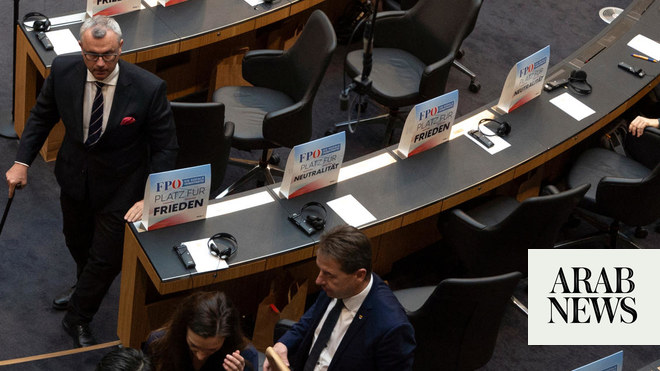
There is no doubt as to the origins of Austria’s governing Freedom Party. Established in 1956 by a former Nazi and SS officer, the far-right populist party is now bringing its extremist politics into the Austrian mainstream. The party’s growth has led to the chancellor’s own People’s Party, ostensibly of the center, to also adopt extremist policies.
Following the closure of seven mosques last month, plans to create a register of Jews and Muslims who would be allowed to buy kosher and halal meat, respectively, were made public last week. Given the role of Austria in the history of Nazism and anti-Semitism generally, the growing presence of such forces in the country’s political mainstream is of great concern.
Gottfried Waldhausl, who serves as a local minister in the state of Lower Austria for the Freedom Party, announced a proposal last week to create a national registry of Jews, so that only Jewish citizens would be permitted to buy kosher meat. The plans, thought to also extend to Muslims, are a chilling reminder of Austria’s Nazi past, and have drawn the consternation of observers both in and outside the central European republic.
The party has since sought to cloak the proposals under the pretext of animal welfare. However, there seems to be only one reason why a reactionary such as Waldhausl would propose such a discriminatory policy. The act of forcing people to register as Jews to buy kosher meat reflects shameless, unadulterated anti-Semitism, echoing the darkest days of Austria’s history. In a reference to Nazism, the American Jewish Committee tweeted in German after discussions of the plans were made public: “Soon with a star on the chest?”
Worryingly, the proposals have since received the support of senior figures within the government. The Austrian vice chancellor and leader of the Freedom Party, Hans Christian Strache, has called for a ban on the ritual slaughter of animals for meat — for all intents and purposes, a veiled slight against the country’s Jewish and Muslim communities.
Though he has tried to stress his support for Jewish traditions and religious freedoms, he is known for his intolerance of foreigners, and his reassurances will do little to conceal the increased presence of the far right in Austrian politics. The very fact that such debates are taking place reflects a growing trend in Austria and elsewhere on the continent.
Concerns with the Freedom Party have grown significantly, owing to repeated statements and actions by its members that illustrate an ambition to fulfil the policies of the Nazis. Earlier this year, Juurgen-Michael Kleppich, a district councilor in Vienna, drew criticism for posting a photo of his grandfather in a Nazi uniform. This followed plans by the party’s Interior Minister Herbert Kickl to “concentrate” asylum-seekers in mass quarters, triggering memories of Nazi wartime ghettos.
Arguably, the most frightening development was a party official in the south of the country who described refugees as “untermenschen” (subhuman). The use of a term so closely associated with the racial theories of the Nazis should have met the full force of the law under Austria’s Verbotsgesetz (Prohibition) Act, which banned the Nazi Party and provided the legal grounds for the process of denazification. However, the regularity of such statements seems to have desensitized the Austrian political scene, allowing for such a discourse to becoming increasingly acceptable.
The Mauthausen Committee, a non-partisan group that defends democracy and civil society, recently published a report recording that there have been 38 incidents of “extreme-right activity” inside the Freedom Party since it joined the coalition government nine months ago.
The incidents included “anti-Semitism, flirtation with neo-Nazism and incitement against refugees and other minorities.” Given the seriousness of such developments, it is only fitting that the committee, named after a former wartime concentration camp, draws attention to the increase in such hate crimes.
Within the context of far-right leaderships taking hold in Austria, Hungary, Italy, Poland and elsewhere, it is critical that the other leaders of the EU make clear that such ideologies have no place in the Europe of today.
Zaid M. Belbagi
From the chaos and economic deprivation of the late 1920s and 1930s, Europe’s fascist leaders were welcomed by the international community for the stable government and ambitious development programs that they promised.
American newspaper journalists visiting Nazi Germany would wax lyrical about how punctual trains were and how well-regulated traffic was. In reality, Hitler’s leadership only brought darkness to his people and the entire continent.
Within the context of far-right leaderships taking hold in Austria, Hungary, Italy, Poland and elsewhere, it is critical that the other leaders of the EU make clear that such ideologies have no place in the Europe of today.
With very real challenges facing the union going forward — such as the prospect of division, Russian expansionism, slow economic growth and a potential trade war with the US — all the preconditions for such reactionary politics to thrive exist. It is therefore essential that they not be allowed to flourish.
• Zaid M. Belbagi is a political commentator, and an adviser to private clients between London and the Gulf Cooperation Council (GCC).
Twitter: @Moulay_Zaid
Disclaimer: Views expressed by writers in this section are their own and do not necessarily reflect Arab News" point-of-view











